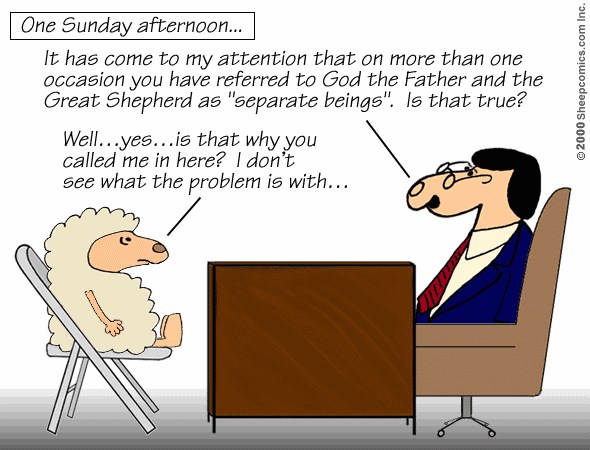
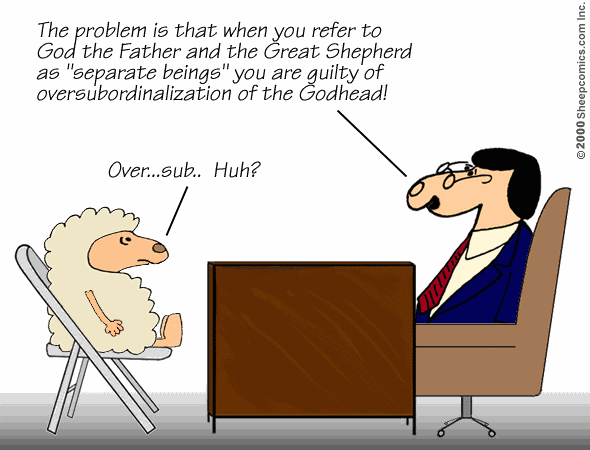
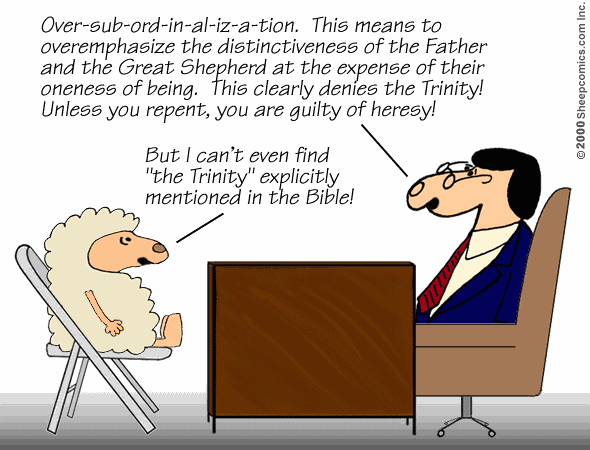
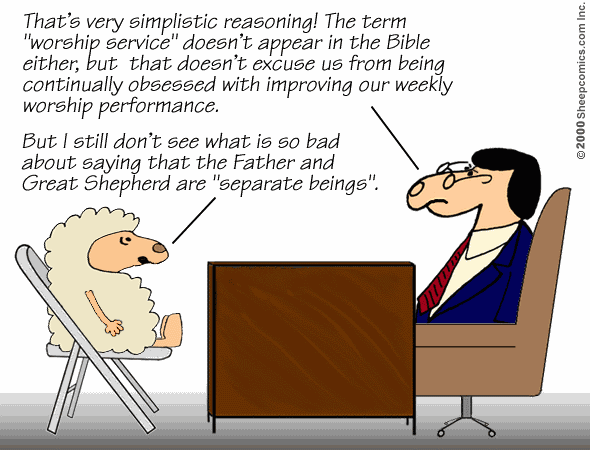
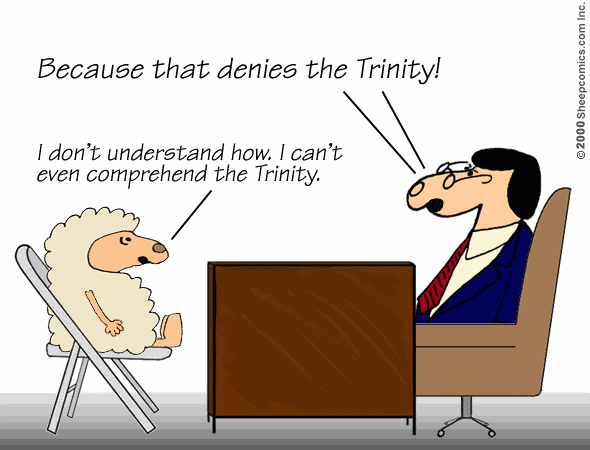
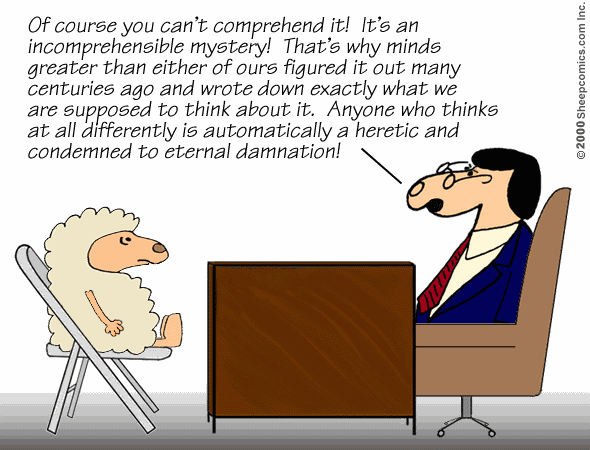

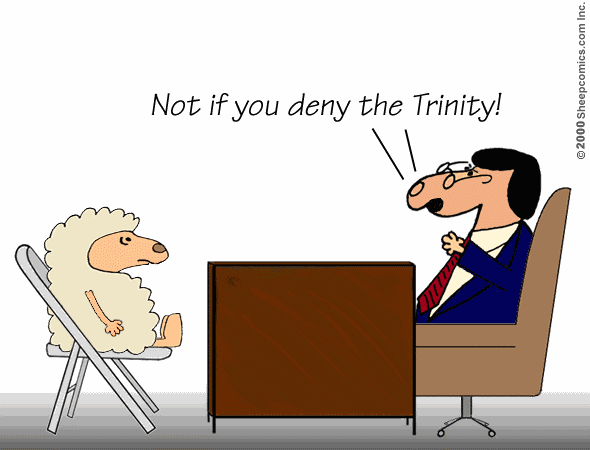
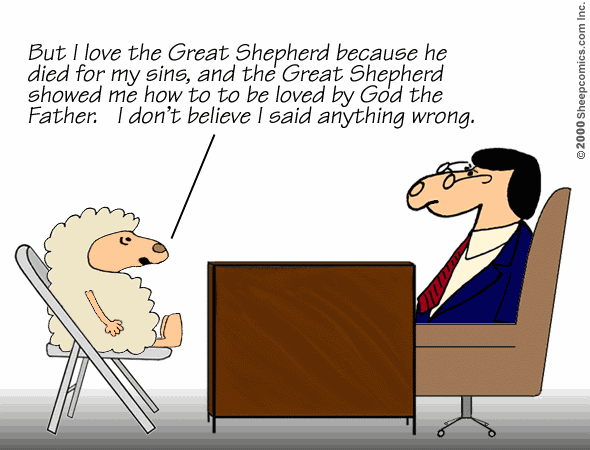
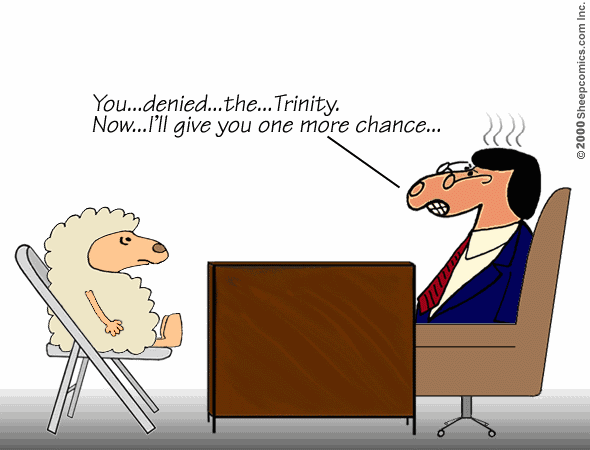


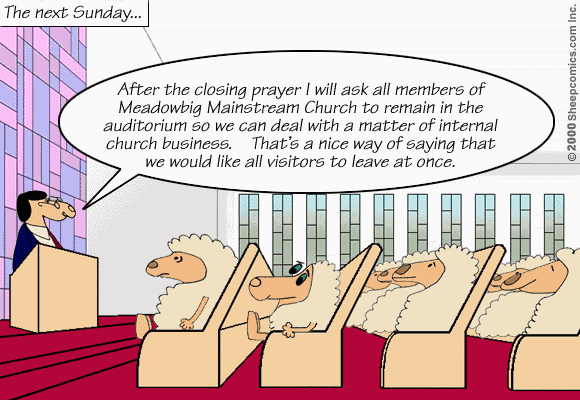
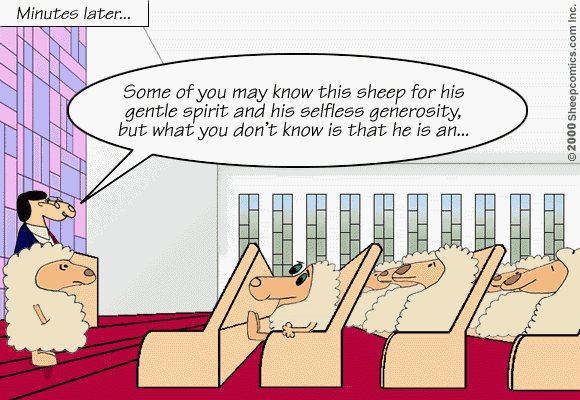
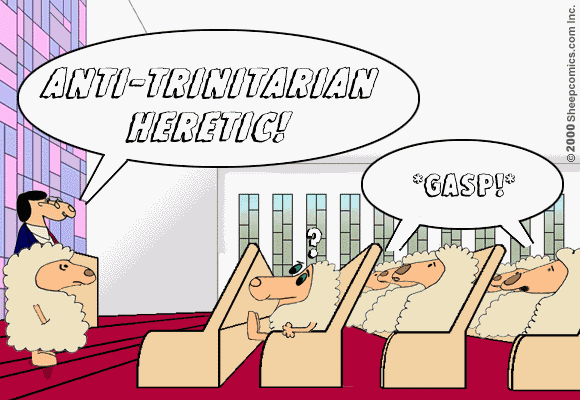
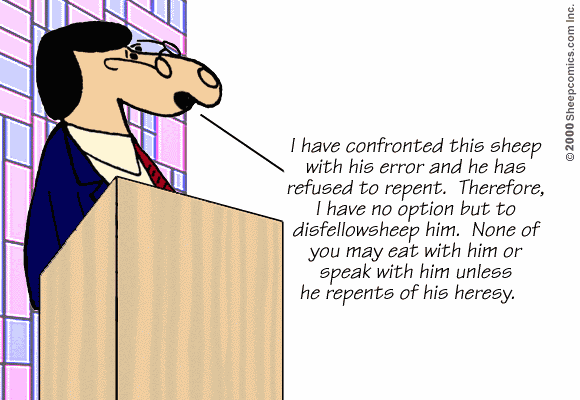


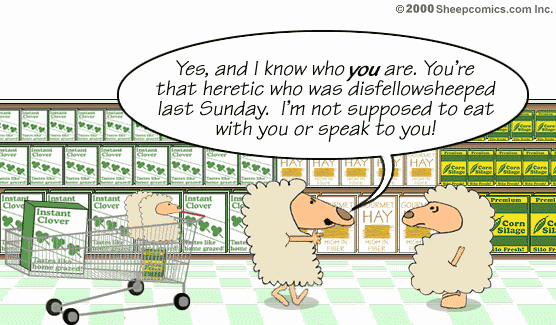



Editorial Notes
It is not my policy to "name names" in cartoons or editorials. I much prefer to work in the realm of ideas rather than specific people or organizations.
This episode is an exception. In my editorial below I make mention of Gwen Shamblin, the creator of "The Weigh-Down Diet", and a controversial figure in some Christian circles. I also make mention of Christianity Today magazine.
I am neither a critic nor supporter of Gwen Shamblin or "The Weigh-Down Diet." Also, my purpose is not to make a general statement about Christianity Today magazine. In fact, I subscribe in order to keep in touch with whatís going on in general Christendom.
The October 23rd, 2000 issue of Christianity Today magazine caught my eye as soon as it arrived at my house. On the red tinted cover is the word "Hell" in bold letters, with a "grim reaper" standing in the background. It looked ominous.
I noticed in the upper left corner of the cover were the words "Weigh-Down Heresy?" I knew that "Weigh-Down" referred to a diet program created by Gwen Shamblin. I wondered what could be heretical about a diet program.
I opened up the magazine to page 15 and read an article that covers less than one page and that seeks to prove that Gwen Shamblin holds "heretical views of the Trinity". Now, Iím not an expert on the "Trinity". I have always assumed that the word "Trinity" is a way of expressing that the Godhead consists of God the Father, Jesus the Son, and the Holy Spirit, each of which are deity. They are different, yet are somehow one. Iíve always thought of the word "Trinity" a way to describe something that we humans can never fully comprehend, at least not in this life.
I also assumed that to become an "anti-Trinitarian heretic" one would have to deny the existence or deity of the Father, the Son, or the Holy Spirit. Boy was I wrong. In this article, Gwen Shamblin is shown to be "anti-Trinitarian" simply because she apparently made a statement that the Father and the Son are "two separate beings". Thatís it. End of story. She is condemned as "clearly Anti-Trinitarian". Therefore, she is a heretic, and we know where heretics spend their eternity. (Hint: see front cover of magazine.)
Jesus said in Matthew 7:1-2
"Do not judge, or you too will be judged. For in the same way you judge others, you will be judged, and with the measure you use, it will be measured to you."
And, in Luke 6:37
"Do not judge, and you will not be judged. Do not condemn, and you will not be condemned. Forgive, and you will be forgiven."
Also, James wrote in James 2:12-13:
Speak and act as those who are going to be judged by the law that gives freedom, because judgment without mercy will be shown to anyone who has not been merciful. Mercy triumphs over judgment!
As I approach the middle years of my life, I take that life less and less for granted. I knew it intellectually as a young man, and now I both know it in my mind and feel in my heart that one day I will stand before the judgment seat of the Lord and give and account for my life. Thatís a terrible and awesome thought if you take it to heart.
I also know that the way I judge and condemn others, as well as the mercy I have shown, will be admissible "evidence" in my hearing. In recent years I have become very reluctant to decide for God who is saved and who is not. In fact, I would rather look for reasons why a person should be saved than condemned.
So, since this Christianity Today article has made the effort to tell the world why Gwen Shamblin should be condemned, I am going to make an effort to see if she can be saved. Iím not trying to be anti-Trinitarian, just pro-mercy. (Mercy triumphs over judgment, remember?) Letís see what happens.
I know that there are certain attitudes and sins, if not repented of, that will shut one out of the Kingdom of God. There are several passages in the scriptures that describe these. 1 Cor 6:9-10 and Gal 5:19-21 are two examples. I havenít noticed among any of these passages the "sin" of not understanding precisely how God the Father and Jesus are "one" or "separate" or both.
The Apostle Paul summarized the Gospel in 1 Corinthians 15:1-5.
Now, brothers, I want to remind you of the gospel I preached to you, which you received and on which you have taken your stand. By this gospel you are saved, if you hold firmly to the word I preached to you. Otherwise, you have believed in vain. For what I received I passed on to you as of first importance : that Christ died for our sins according to the Scriptures, that he was buried, that he was raised on the third day according to the Scriptures and that he appeared to Peter, and then to the Twelve.
Does using the phrase "separate beings" to describe oneís understanding of the Godhead necessarily conflict with the Gospel Paul preached? Does it preclude obeying the commands of Jesus Christ as to how we treat our fellow humans? Does it preclude loving Jesus or God? If so, I canít understand how.
Does it preclude believing any particular Bible verse that describes how God the Father and Jesus the Son are related to each other? Thatís a difficult question. Iím sure I could write a long paper about that, but right now Iím just trying to find some mercy for people who might think in their minds that God the Father and Jesus the Son are "separate beings".
An interesting note: the Greek word behind "heresy" is "hairesis". In Acts 24:14, "hairesis" is translated "heresy" in the KJV and as "sect" in many other translations. The technical definition of the word "heresy" is not simply "being wrong about something". It has more to do with creating a "sect" or division. Is thinking of God the Father and Jesus as "separate beings" the same as forming a sect?
To me, a key passage is Colossians 2:9:
For in Christ all the fullness of the Deity lives in bodily formÖ(NIV)
Thatís an important concept. The "fullness" of God lives in Christ. I can tell they have the same nature, but not how "separate" they are. In my mind, they could possibly be "separate beings", and the fullness of the Deity (God) could still live in Christ.
I went to a web site and found a list of scripture references that are presented as proof that Jesus is God the Father, and therefore proof that it is heretical to think of them as "separate beings". Letís look at them. (This is not a list of all scriptures used to prove the doctrine of the Trinity. Iím just trying to make point.)
Isaiah 9:6
For to us a child is born, to us a son is given, and the government will be on his shoulders. And he will be called Wonderful Counselor, Mighty God, Everlasting Father, Prince of Peace. (NIV)
Does this mean the Everlasting Father is being born as a child? Is the "son" in this passage the Everlasting Father? Does the phrase "will be called" in the passage above indicate that the son is indeed one and the same as what it is called?
Letís look at the King James translation:
For unto us a child is born, unto us a son is given: and the government shall be upon his shoulder: and his name shall be called Wonderful, Counsellor, The mighty God, The everlasting Father, The Prince of Peace. (KJV)
Notice how the KJV version includes the word "name" and the NIV does not? (I bolded the difference so it would stand out, as I will henceforth.) The NIV says "he will be called", but the KJV says "his name shall be called". Are we describing the child or the childís name? It makes a difference. A name does not define a personís actual substance. Jesus changed Simonís name to Cephas (Peter) in John 1:42. This means "rock", but the Apostle Peter was not an actual rock.
One of the most famous and difficult verses is John 1:1.
In the beginning was the Word, and the Word was with God, and the Word was God. (NIV)
Here we have a paradox. The Word (Jesus) is both "with" God and "was" God. How can this be?
Hereís one thing I learned during this study. The word "God" in the New Testament typically has behind it the Greek word "theos", which means "deity". It is typically translated "God". That capital "G" immediately makes us think "God the Father".
The New International Version, New American Standard, and King James all say "Word was God." Amazingly, not all Bible translations do this.
One of the little known jewels of my Bible collection is The New Testament, an Expanded Translation by Kenneth S. Wuest, Teacher Emeritus of New Testament Greek at the Moody Bible Institute. The preface says that this translation was created with the purpose of using "as many English words as necessary to bring out the richness, force and clarity of the Greek text."
Here is John 1:1 in Wuestís New Testament.
In the beginning the Word was existing. And the Word was in fellowship with God the Father. And the Word was as to His essence absolute deity. (Copyright Wm. B. Eerdmans Publishing Co. 1961)
In this translation, I am not forced into the paradox of Jesus being "with" God and being God at the same time. Jesus is in His essence absolute deity, much the same as Paulís writing in Collosians 2:9.
A little further in John 1 we have verse 18.
No one has ever seen God, but God the One and Only, who is at the Father's side, has made him known. (NIV)
Here another seeming paradox, but letís look at another translation:
No man hath seen God at any time; the only begotten Son, which is in the bosom of the Father, he hath declared him. (KJV)
Itís not so much of a paradox in the King James Version.
In John 20:28, we have the account of "doubting Thomas".
Thomas said to him, "My Lord and my God!" (NIV)
Is this proof that Jesus and God the Father are the same being? Did Thomas say "God the Father"? No. When we go back into the Greek, Thomas said something like "My master and my deity". Remember that all the fullness of the Deity dwells in Jesus. Saying "my God" to Jesus is appropriate.
The next prooftext is Acts 20:28.
Be on guard for yourselves and for all the flock, among which the Holy Spirit has made you overseers, to shepherd the church of God which He purchased with His own blood. (NIV)
This one looks hard to ignore or rationalize away. Was it God the Fatherís blood that purchased the church of God? WellÖin my interlinear Greek bible there is a footnote with an alternate reading of "His own blood" as "the blood of His own". Thatís a very different meaning, and not so much of a paradox.
Next we have Romans 9:5.
Theirs are the patriarchs, and from them is traced the human ancestry of Christ, who is God over all, forever praised! Amen. (NIV)
Is Christ "God over all"? Not in the King James Version.
Öwhose are the fathers, and from whom is the Christ according to the flesh, who is over all, God blessed forever. Amen. (KJV)
Next on our list is Titus 2:13.
Ö while we wait for the blessed hope--the glorious appearing of our great God and Savior, Jesus Christ, (NIV)
Once again, the King James version reads very differently.
Looking for that blessed hope, and the glorious appearing of the great God and our Saviour Jesus Christ;
Next on the list is Hebrews 1:3
The Son is the radiance of God's glory and the exact representation of his being, sustaining all things by his powerful word. After he had provided purification for sins, he sat down at the right hand of the Majesty in heaven. (NIV)
Does this show that the Son and God the Father are the same being? No. The Son is the "exact representation". The Greek word behind "representation" is "charakter" (sure looks like our English word "character"). My Greek dictionary says this means "exact copy", which is not "the same thing."
A little farther down in Hebrews 1:8 we haveÖ
But about the Son he says, "Your throne, O God, will last for ever and ever, and righteousness will be the scepter of your kingdom. You have loved righteousness and hated wickedness; therefore God, your God, has set you above your companions by anointing you with the oil of joy." (NIV)
Taken literally, is there one "God" here or two? I counted two. One "God" seems to be the Son of the other. Remember that all the fullness of the Deity (God) dwells in Jesus (the Son).
Next we have 2 Peter 1:1
Simon Peter, a servant and apostle of Jesus Christ, To those who through the righteousness of our God and Savior Jesus Christ have received a faith as precious as ours: (NIV)
But "our God and Savior" reads a bit differently in the King James version.
Simon Peter, a servant and an apostle of Jesus Christ, to them that have obtained like precious faith with us through the righteousness of God and our Saviour Jesus Christ: (KJV)
Finally (whew!) we have 1 John 5:20.
We know also that the Son of God has come and has given us understanding, so that we may know him who is true. And we are in him who is true--even in his Son Jesus Christ. He is the true God and eternal life. (NIV)
You can probably see this comingÖ
And we know that the Son of God is come, and hath given us an understanding, that we may know him that is true, and we are in him that is true, even in his Son Jesus Christ. This is the true God, and eternal life. (KJV)
First, there is the "He is the true God" versus "This is the true God". Also, saying that Jesus is the "true God" (deity) is not the same as saying that "Jesus is God the Father".
If there is one thing Iíve learned from the above exercise, is that if you want to condemn someone for saying that Jesus and God the Father are "separate beings", things go much better if you use the New International Version of the Bible. Jesus and God the Father are more "separate" in the wording of the King James.
Furthermore, I still have no reason to condemn anyone for saying that Jesus and God the Father are "separate beings". Can we ever in this life understand just how "one" or "separate" God the Father and Jesus are?
I personally believe that God the Father and Jesus the Son are both eternal in respect to our time continuum. I believe that Jesus the Son was "begotten", not "created". Someone "begotten" shares the nature of that which "begot" it. This is not necessarily true for something "created". (Having just "begotten" a son myself, I understand this a little more.) I believe that all the "fullness" of God the Father is and was in Jesus, before, during, and after His time on Earth. In other words, God the Father and Jesus the Son are of the same nature.
I believe that Jesus was with God the Father "in the beginning" before the creation of the world. I can also see plainly from scripture that Jesus submitted to God, even to death on a cross, so we can be reconciled to God the Father. God the Father raised Jesus from the dead. Jesus is seated on the "right hand" of God in the heavenly realm. I see a "separateness" that runs from the beginning of the Bible to the end.
I also believe that we need to agree what God the Father and Jesus said about themselves. Did Jesus ever explicitly claim to be the "same being" as God the Father?
We should be aware of committing specific error mentioned in scripture. It is ironic that one particular false teaching that is explicitly mentioned later by the Apostle John in both of his letters is the idea that Jesus did not come in the flesh. So, we must believe the Jesus came in the flesh. In other words, He wasnít just a "spirit" who looked like flesh.
I know that Jesus said that "I and my Father are one" (John 10:30 KJV). Was Jesus saying that "I am God the Father"? Here Iíll let John interpret John. Below is John 17:21-23 (KJV)
Neither pray I for these alone, but for them also which shall believe on me through their word; That they all may be one; as thou, Father, art in me, and I in thee, that they also may be one in us: that the world may believe that thou hast sent me. And the glory which thou gavest me I have given them; that they may be one, even as we are one; I in them, and thou in me, that they may be made perfect in one; and that the world may know that thou hast sent me, and hast loved them, as thou hast loved me.
Jesus prayed for all who believe in him to be "one", just as Himself and the Father are "one". If Jesusí words in John 10:30 mean that Jesus and God the Father are the "same being", than it logically follows that Jesus must be praying here in John 17 for all those who believe in him to be "God the Father" too. This of course is nonsense.
I can see how a person with all honesty, after studying the scriptures, could think of God the Father and Jesus the son as "separate beings". Are they? I personally reserve the right to simply say "I donít know". I canít tell how "one" or "separate" God the Father and Jesus are when it comes to their "being". I donít believe God the Father or Jesus will hold us accountable for not getting it precisely right. I wonít pretend to know what "being" means in the realm of deity. I can believe everything I read in scripture without making a judgment call in this area. I am aware that this may make me a "heretic" to some of you. Will I see "Sheep Comics Heresy?" on a magazine cover someday?
The best comment I found on the Trinity is in on page 86 of the Jewish New Testament Commentary by David H. Stern.
"But the bottom line is that it is more important to believe Godís word and to trust him than to argue over particular doctrinal or verbal formulas used in attempting to describe the nature of God." (copyright 1996, David H. Stern)
This editorial really isnít about Gwen Shamblin or Christianity Today. Itís about tolerance, and about how much or little oneís thinking can diverge from "orthodoxy" before we can rightfully declare someone a "heretic". Are two or three words taken out of context adequate proof? I would like to at least try to argue in favor of someoneís salvation before personally condemning them in print before hundreds of thousands of readers. Thatís just where Iím at with my Christianity "today".